 Research Article
Research Article
Build a Strong Defense Line of “Advancing and Consolidating Poverty Alleviation” to Help Rural Revitalization
Yunlin Zhou, Xuanhua Chen, Ziqi Lin, Qiang Huang, Xiaoyun Li, Danxin Zhong, Gui Chen and Jiujiang Zhu*
School of Civil Engineering and Architecture, Wuyi University, China
Jiujiang Zhu, School of Civil Engineering and Architecture, Wuyi University, China.
Received Date: February 24, 2022; Published Date: March 28, 2022
Abstract
At present, the nationwide poverty alleviation has achieved a comprehensive victory. It is not only necessary to overcome the difficulties, but also to consolidate the results, and more importantly, to prevent the new occurrence of poverty or falling back into poverty. The Student-Origin- Based Credit Loan Policy of Chinese Government is an important means to solve the problem of family financial difficulties for students to complete their studies smoothly and to achieve educational fairness and justice. In order to build a strong line of defense against poverty and prevent falling back into to poverty, the team came to Tangkou Town, Kaiping City to carry out field investigation. Through interviews with local village committees, questionnaires issued to villagers, and propaganda campaign for the Student-Origin-Based Credit Loan Policy of Chinese Government, it is possible to understand the economic situation of local families in rural areas and the popularity of the student loan policy, and to analyse the results of poverty eradication and the current situation of the national education credit loan policy in rural areas in the context of the overall well-off society and precise poverty eradication. As a result, the existing problems can be better analyzed, and corresponding responses proposed, thus contributing to the realization of the next 100-year goal.
Keywords:Poverty alleviation; The Student-Origin-Based Credit Loan Policy of Chinese Government; Poverty alleviation without falling back; Rural revitalization
Introduction
Research content
The name of Wuyi University is a combination of ‘’Wu’’ (means 5 in Chinese) and ‘’Yi’’ (means county in Chinese), which was nominated based on the fact that the city consists of five counties. A group of students from the University formed a research team named “Yi-Xin-Zhu-Meng”. The term “Zhu-Meng” means “to build a dream” while “Xin” means heart in Chinese, so “Yi-Xin-Zhu-Meng” stands for “the hearts fascinated the city wish to build a dream’’. It is interesting that “Yi-Xin” also means “be bent wholeheartedly on” in Chinese.The team, Yi-Xin-Zhu-Meng, has carried out social research on the theme of “Yi-Xin-Zhu-Meng--Building a Strong Defense Line of Advancing and Consolidating Poverty Alleviation to help Rural Rejuvenation” to combine Party history learning and education with social practice to promote the national policy on education credit loans and to build up a line of defence against poverty and returning to poverty. The activities are mainly offline, supplemented by online activities.
Research background
In 2020, with the attention of the whole world, the Communist Party of China intended to unite and lead the Chinese people to achieve the first centenary goal, build a moderately prosperous society on the land of China in an all-round way, and historically solve the problem of absolute poverty. 2021 is the 100th anniversary of the founding of the party, and it is also the first year to declare a complete victory in the fight against poverty. At such a significant time point, this team has launched a practical social activity entitled “Yi-Xin-Zhu Meng - Advancing and Consolidating Poverty Alleviation to Help Rural Rejuvenation”. In this social practice activity, the Yi-Xin-Zhu- Meng Team came to Tangkou Town, Kaiping City, and conducted interviews and surveys on the village committees and povertystricken households in the town.
Research significance
• Through offline questionnaire surveys and interviews with
groups in which students with financial difficulties dominate,
combined with the reality, their views and suggestions on the
national funding policy can be understood, thus contributing
to building a solid line of defense for “getting rid of poverty
without falling back into poverty”.
• Through this activity the team will thoroughly implement
the history of CPC (Communist Party of China), strengthen the
team spirit of college students, and set up a high-quality team.
Under the guideline of contribution to the fullest, the students
are thus able to understand, recognize and serve the society as
well as to get some social experiences in practice.
Samples and Data
Data collection method
Document analysis: Library documents, subscription to Tangkou Town’s public account, search for related materials online, and websites of Learning Power.
Survey: Questionnaire survey, interview (direct interview), field survey.
Basic situation of the sample
Brief introduction of activity survey:
a. The main content of the student questionnaire survey:
1) Basic family situation
2) University living expenses
3) The degree and means of understanding of the relevant
policies of education loans
4) Implementation of the National Student Loan Policy
5) Confidence and outlooks on loan repayment after
graduation
6) Understanding and suggestions on the student loan policy
b. Main content of parent questionnaire survey:
1) Family economic status, members and labor
2) The level of understanding and ways of the relevant
policies of student loans
3) Understanding and suggestions on the student loan policy
Research time and place:
Time: July 16, 2021-August 1, 2021.
Location: Tangkou Town, Kaiping City, Jiangmen City, Guangdong Province.
Activity schedule
Formula 1: Specific schedule of activities.
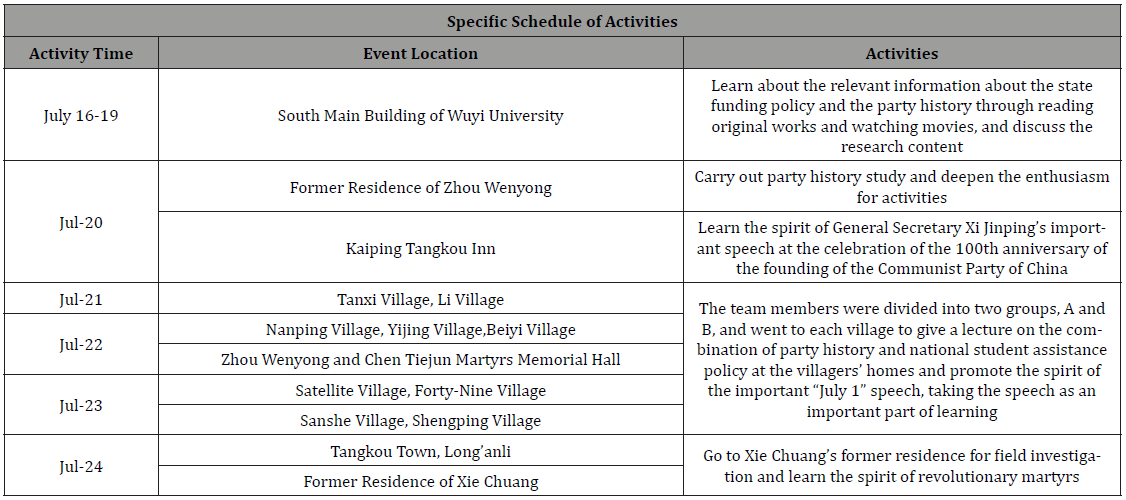
Combination and Analysis of Party History and Interview Outline
Background
Since the Eighteenth National Congress of the Communist Party of China, the Party Central Committee has implemented precise poverty alleviation and targeted poverty alleviation, increased investment in poverty alleviation, and innovated poverty alleviation methods and the country has achieved decisive achievements in poverty alleviation that have attracted worldwide attention. On February 25, 2021, when the National Poverty Alleviation Summary and Commendation Conference was held, General Secretary Xi emphasized that through the joint efforts of the whole party and the people of all ethnic groups in the country, Chinese people’s battle against poverty has achieved a comprehensive victory at the very moment of the 100th anniversary of the founding of CPC comprehensive victory. According to the current standards, 98.99 million rural poor people have been lifted out of poverty, all 832 poor counties have got rid of poverty, 128,000 poor villages have all been unlisted, regional overall poverty has been resolved, and the arduous task of eradicating absolute poverty has been completed, thus creating a miracle brilliant enough to shine in the annals of human history!
General Secretary Xi Jinping emphasized at the symposium on decisive victory over poverty alleviation that “it is very difficult to consolidate the results of poverty alleviation” and that according to the preliminary results of various localities, nearly 2 million people who have been lifted out of poverty are at the risk of falling back into poverty, and there are nearly 3 million among the marginalized population are on the edge of poverty”. To consolidate the results of poverty alleviation, it is required to prevent the occurrence of poverty effectively. This requires the awareness of preventing and resolving the risk of returning to poverty in the work of poverty alleviation and implementing targeted measures for people at the risk of falling back into poverty, so as to control the risk of returning to poverty in all aspects.
The team experienced the hardships of grassroots cadres and witnessed the real state of the masses in this “war” through field visits and inquiries.
Status Quo and Analysis
A. The status quo and analysis of the village committee and villagers’ understanding of the national Student-Origin-Based Credit Loan policy
On the one hand, when asked about the degree of understanding of the policy of the Student-Origin-Based Credit Loans, most parents and students said that they knew little or better (40.39% parents knew a fat lot about this policy, 12.5% better, and 32.69 nothing). Whereas 52% students had some basic understandings about this policy and 27% know more about it. The villagers’ lack of understanding of the policy reflects the lack of publicity and the failure to popularize and penetrate into rural households; there are few publicity boards in the village and lack of maintenance, and they are mainly concentrated near the village committee. Most of the content released take “precise poverty alleviation, precise poverty eradication” as the theme of policy publicity and government affairs disclosure, event announcements, recruitment information, etc. [1].
On the other hand, through the interviews of village officials under the jurisdiction of Tangkou Town, it can be seen that most of them knew so little about this policy that they just had heard of it, and that they knew almost nothing about its contents, application procedures , post-loan interest, etc. The village cadres were very cooperative with the investigation and research activities and explained the reasons why they have less understanding of the policy. With the development of Internet technology, the application procedures are getting less and easier, some of which are not linked with the village committee anymore. After the interview, the staff of the village committee also asked for some promotional pamphlets, which can be kept in the village committee for the villagers in need to browse. Then they were provided with approaches to browse and WeChat propaganda videos.
B. The status quo and analysis of village committees and villagers’ understanding of poverty alleviation work
The implementation and promotion of the “targeted poverty alleviation and reduction” policy is the key task of all townships before the victory in poverty alleviation. The team interviewed poverty-relieved households and village committee staff in Nanping, Yijin, Tanxi, Beiyi, Zhonghe, etc. From the staff of the village committee, it has been learned that most of the former registered households converted to normal households due to changes in the labor structure. In addition, they continue to implement the principle of “Poverty Relief Policies Continue After Counties Being Removed from Poverty List” in their poverty alleviation work. For households that have been lifted out of poverty there will be dedicated personnel to keep an eye on them for 2-3 years to ensure that there is no or little return to poverty.
In the following visits and interviews, it has been found that a considerable part of the village’s low-income households are sick and disabled households, five-guarantee households or households without labor. In terms of the quality of the population, the poor generally have a low level of education, old-fashioned ideas, little awareness of science and technology, and lack the ability to get rich and to find the way out. The assistance measures for povertystricken households are mainly regular financial support according to the poverty alleviation policy. The staff at all levels of the town and city government will conduct condolences about 3 to 4 times a year, and the staff of the village committee will visit, comfort, inform them of new policies and help them file for. They not only provide materialistic assistance but help them find suitable jobs and conduct psychological comforts.
In the talk with the staff of Nanping Village, it has been learned that there is a poverty alleviation project in Tangkou Town, which provides a strong guarantee for winning the battle against poverty. The Tangkou Township Photovoltaic Power Generation Poverty Alleviation Project is built by the town’s party committee and the government under the correct leadership of higher party committee and government and under the auspices of two levels of poverty alleviation funds in Jiangmen City and Kaiping City in 2017 and 2018 as well as the support funds of various assistance units, 900,000 Yuan in total. The project, with an engineering capacity of 104.5 kilowatts, is a long-term asset income project. It uses the state’s subsidy policy for photovoltaic power generation for poverty alleviation. It is estimated that the annual income return will reach 10%. The return period is about 20 years. After deducting the normal management expenditure from the annual power generation income, the remaining part will be used for special purposes like the alleviation of poverty-stricken households, subsidies for extremely disadvantaged people, assistance to lowincome houses and the development of poverty relief industries (Figure 1).
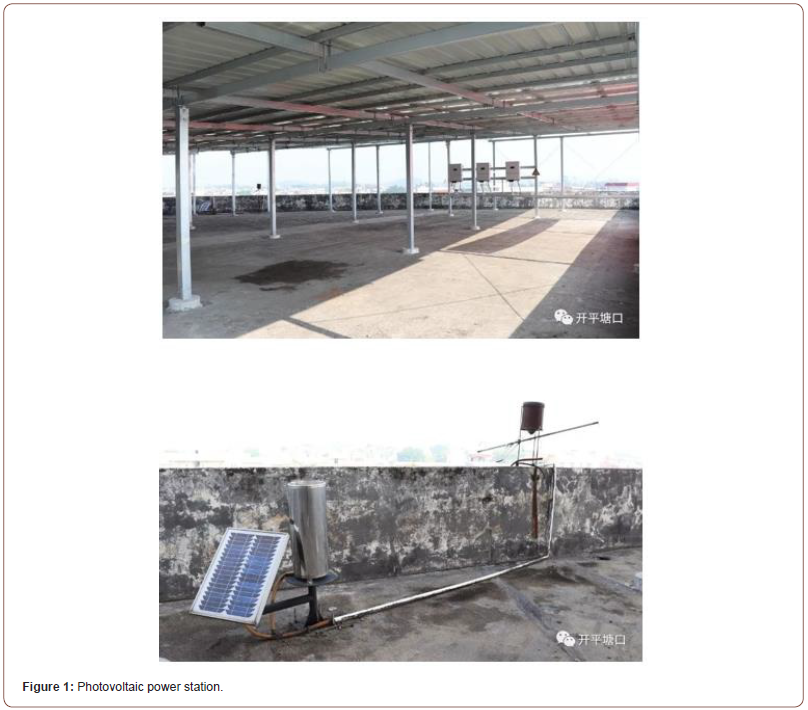
Suggestions
Deepen the industrial development model: Persist in practicing policies in line with the conditions of people and places, work on the innovation of mechanisms, with asset income and photovoltaic as the main means of poverty eradication, supplemented by special breeding and cottage industries, to realize the industry pattern of “households have projects, villages industries, and towns scales” and guarantee the stable income growth of poverty-stricken households fundamentally.
Improve the medical security and assistance system: The family doctor contracting service should be actively promoted, and a family doctor service team formed to sign up the poor population individually. People should establish electronic health records and implement dynamic management so as to ensure that the people who have been lifted out of poverty will not get sick, get less sick, see a doctor, get a good treatment, and not spend money or spend less money. In addition, the construction of medical and health care complexes is being accelerated, and publicity days, health follow-up visits, and charity clinics are being used to strengthen the dissemination of health knowledge on chronic disease prevention and control, and to organise and carry out village charity clinics and distribute free medicines and condolences, so that the “last kilometre” of policy implementation can be effectively addressed [2].
Improve the security system for the elderly and disadvantaged groups: Elderly people living alone in rural areas have become the biggest disadvantaged group in rural areas. They are too old and almost lose the ability to work. This group of people is very dangerous for their families to return to poverty. The elderly may need an adult to take care of them at home due to their physical condition, which leaves the family without a labour force; they may also suffer from sudden illnesses that make the family with a weak financial base bear high medical costs; some elderly people suffer from chronic diseases all year round, but due to the limited medical conditions at the primary level, they have to go to a large hospital for simple treatment, which in effect adds an extra burden to the family. Therefore, in the work of preventing the return of poverty, it is necessary to actively explore a model of elderly care and assistance that is in line with the actual situation in rural areas, to improve the level of grassroots medical care, to open elderly convalescent centres, and to effectively solve the plight of elderly people who are too poor to see a doctor and too afraid to see a doctor. Increase government policy subsidies according to the level of local economic development invisibly increases the extra burden on the family. Therefore, in the prevention of returning to poverty, it is unprecedentedly important to actively explore an old-age care and assistance model that meets the actual conditions in the rural areas, improve the level of primary medical care, and set up nursing centers for the elderly to effectively solve the dilemma of the elderly who are too poor to see a doctor. Increase the government policy subsidies according to the local economic development level [2].
Increase the self-development ability of the poor: Vigorously carry out labor vocational skills training and agricultural practical technology training, make full use of the Dewdrop Project and the new-type farmer training of people’s livelihood projects, and earnestly carry out vocational education, job skills training and entrepreneurship training for the poor. To ensure that the goal of training one person, one person in employment, one household out of poverty, and the goal of training one technology, revitalizing an industry, and enriching the people of one area are achieved.
Advertise and call for the implementation of rural revitalization policies, and call on more creative, energetic, and thoughtful young youths to use their strengths and expertise in the rural revitalization strategy and devote their youth and vitality to rural grassroots work. As the “educated youth” of the new era, the college-studentturned village officials experience life, serve the society, and play a passionate movement worthy of the times, worthy of youth, and no regrets about their mission with their own passion and enthusiasm on the vast rural stage.
Conclusion
Xi Jinping said that the overall victory of the fight against poverty marks a solid step taken by the party on the road of uniting and leading the people to create a better life and achieve common prosperity. At the same time, poverty alleviation and putting off the hat of poverty are not the end, but the starting point for a new life and a new struggle. There is still a long way to go to solve the problem of unbalanced and inadequate development, to narrow the development gap between urban and rural areas, and to realize the all-round development of people and the common prosperity of all people. It is necessary to effectively consolidate and expand the results of poverty alleviation and effectively link various tasks with rural revitalization to make the foundation for poverty alleviation more stable and more sustainable. It is necessary to strengthen the monitoring of the people who are prone to return to poverty and lead to poverty so as to achieve early detection, early intervention, and early assistance. Long-term cultivation and support of industries in areas that have just shaken off poverty shall be required to promote endogenous and sustainable development.
Activity Survey Results and Analysis
In order to better build the defense line of “Advancing and Consolidating Poverty Alleviation”, this survey of the “ Student- Origin-Based Credit Loans” was carried out in Tangkou Town, Kaiping City. A total of 160 questionnaires have been sent out, and the effective questionnaires returned are: 156 copies, the effective recovery rate is 97.5%, of which there are 52 student questionnaires and 104 parent questionnaires.
The main content of the student questionnaire survey
It can be seen from Figure 2 and Figure 3 that more than 50% of students have little or no knowledge of the Student-Origin-Based credit loan policy. It can be seen from Figure 4, for this policy, students mainly learn about it through school propaganda and online information. Government propaganda only accounted for 17.31%. From these data, it can be seen that most students have little or no understanding of the policy, indicating that the publicity efforts of relevant national departments and institutions need to be strengthened, and the continuity and stability of the policy need to be maintained and help implement the “poverty alleviation without returning to poverty”. According to Figure 5, there are still 11% of students who have not heard of this kind of publicity and activities. From these data, it can be seen that most students do not know much about the content of the national Student-Origin-Based Credit Loan policy, or even do not understand, indicating that the publicity work of the policy has not been well implemented.
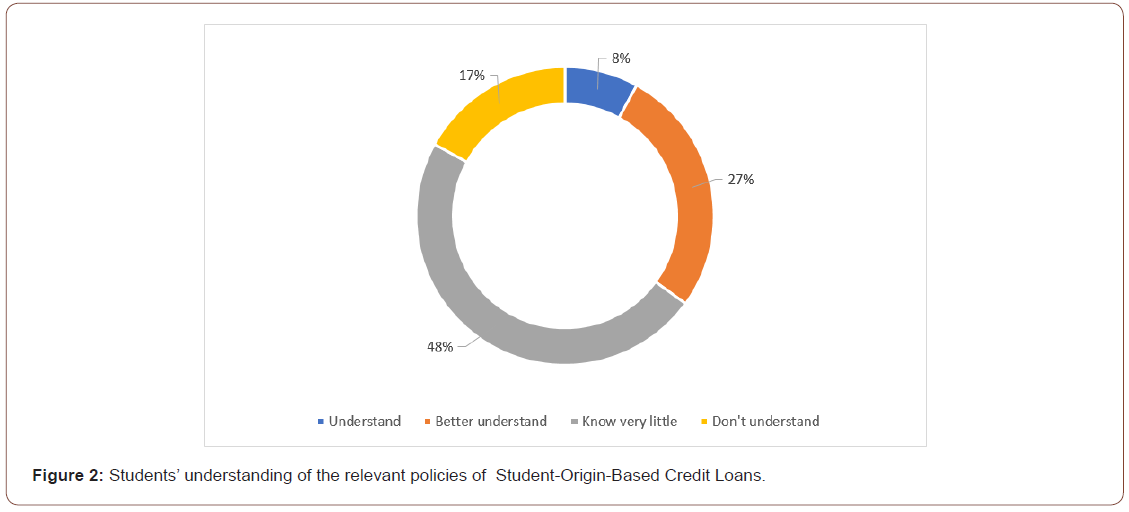
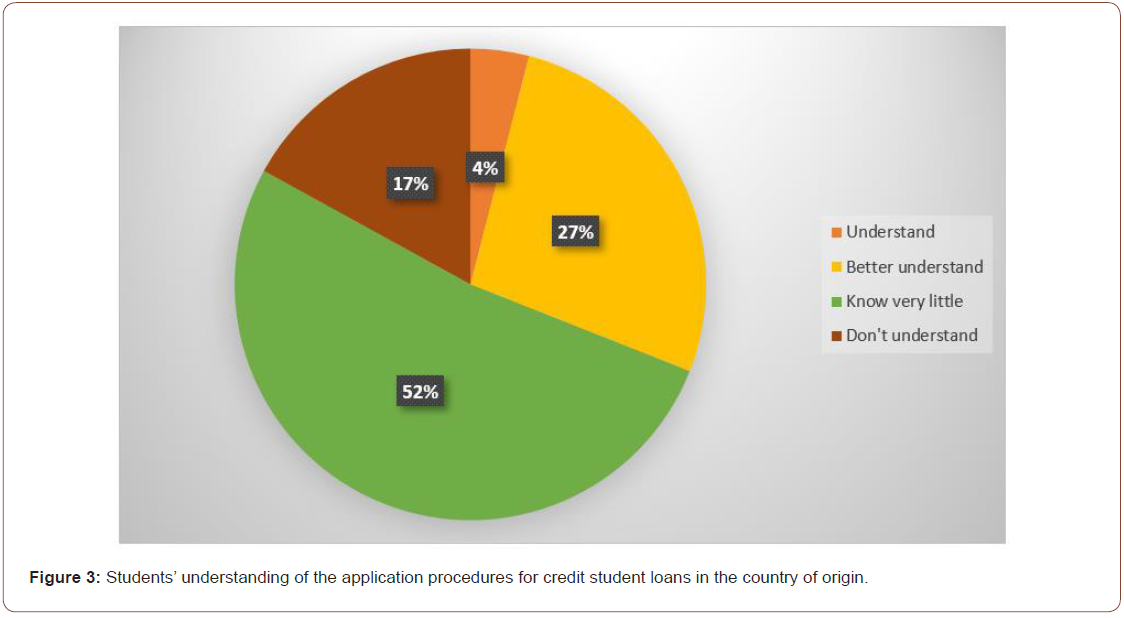
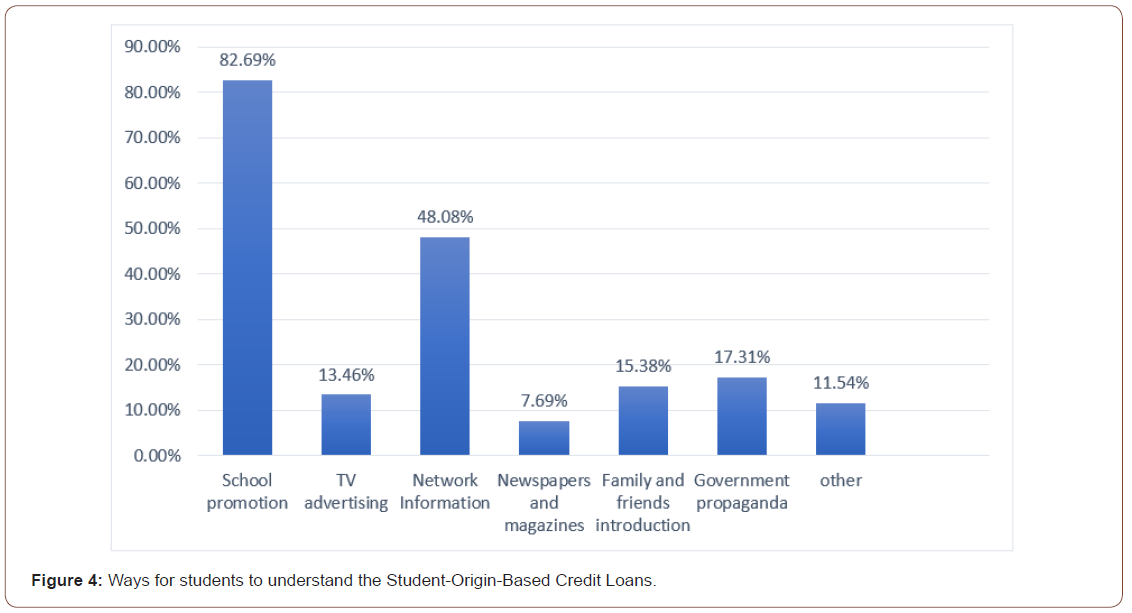
According to Figure 6, there are still 28.85% of students who think ‘’no salary or low wages, financial difficulties’’ is the reason why they cannot reimburse their loans, most of the students think it is an objective reason rather than intentional default, but it is worth noting that 5.77% of students think that “students lack a sense of integrity, and default deliberately.” Therefore, while improving the repayment process and repayment methods, repayment reminder services, etc., it is necessary to strengthen the integrity education for students. In addition, 28.85% of the students believe that the reason for the default is “no wages or low wages, financial difficulties”, which indicates that there is the possibility of “falling back to poverty”. Therefore, it is necessary to build a firm defense line to prevent poverty and to consolidate the results of poverty alleviation (Figure 6).
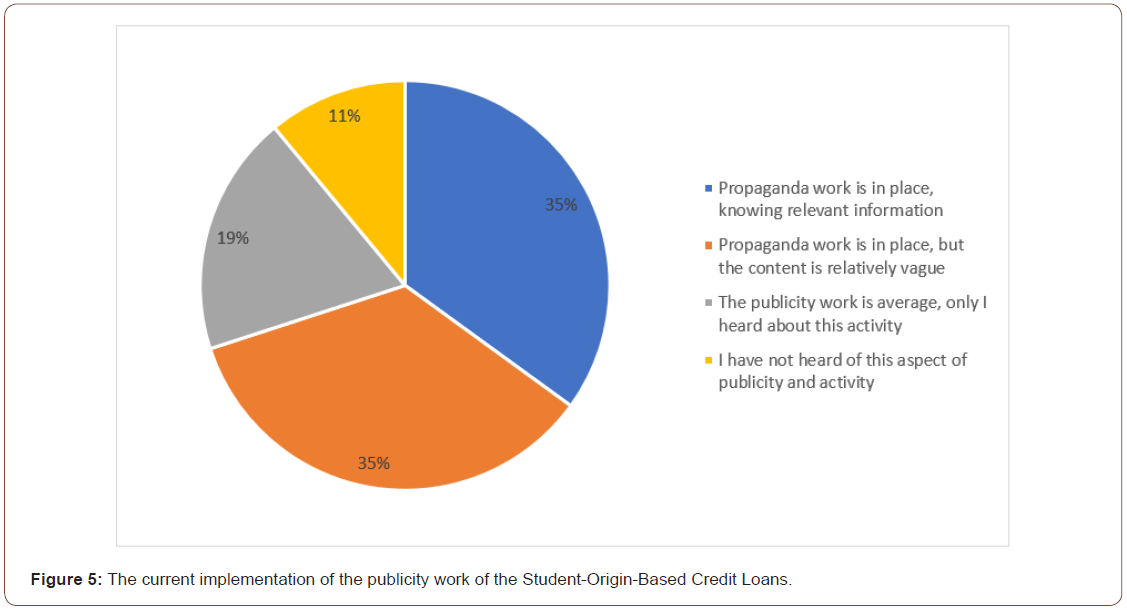
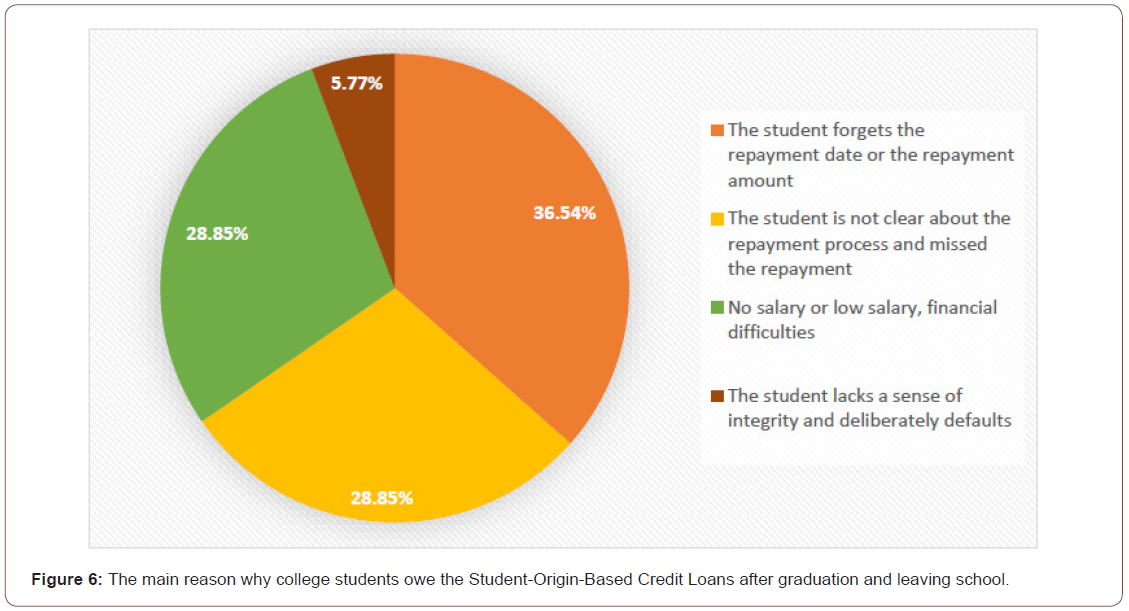
Main content of the parent questionnaire
It can be seen from Figure 7 that 73.08% of parents have little or no knowledge of the national Student-Origin-Based Credit Loan policy, and it can be seen from Figure 9 that the government propaganda only accounts for 20.19% of the way to understand the policy. From these data, it can be seen that most parents have little or no understanding of this policy, indicating that relevant state departments should increase the scope of publicity and increase the publicity of this policy in village committees and neighborhood committees. It is necessary to maintain the continuity and consistency of this policy. Stabilize and help implement the “eliminate poverty without returning to poverty”.
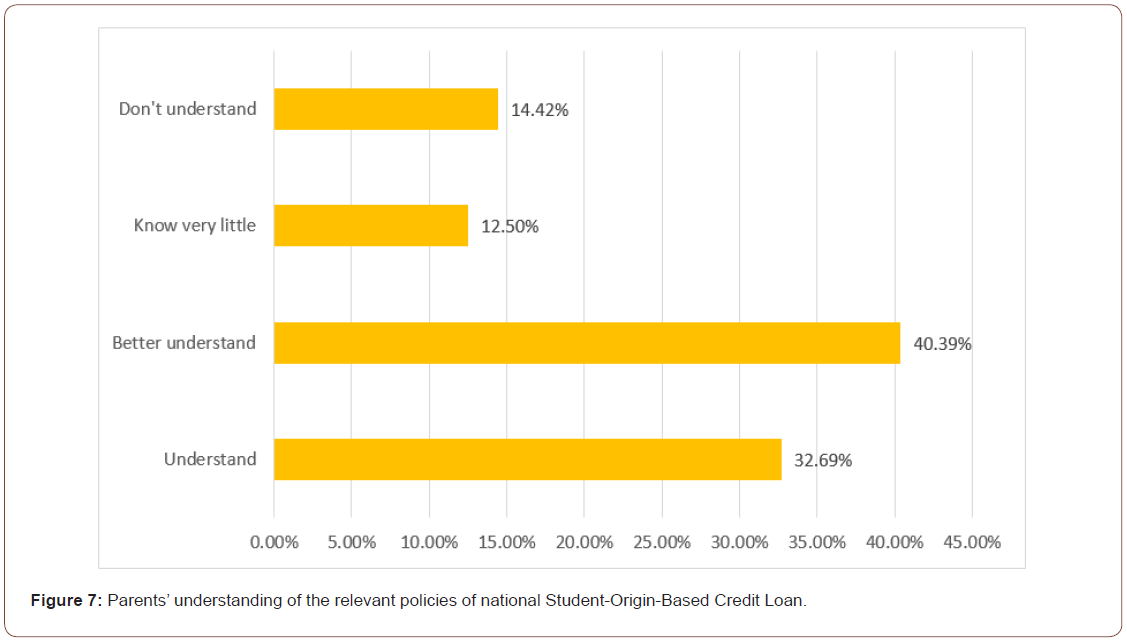
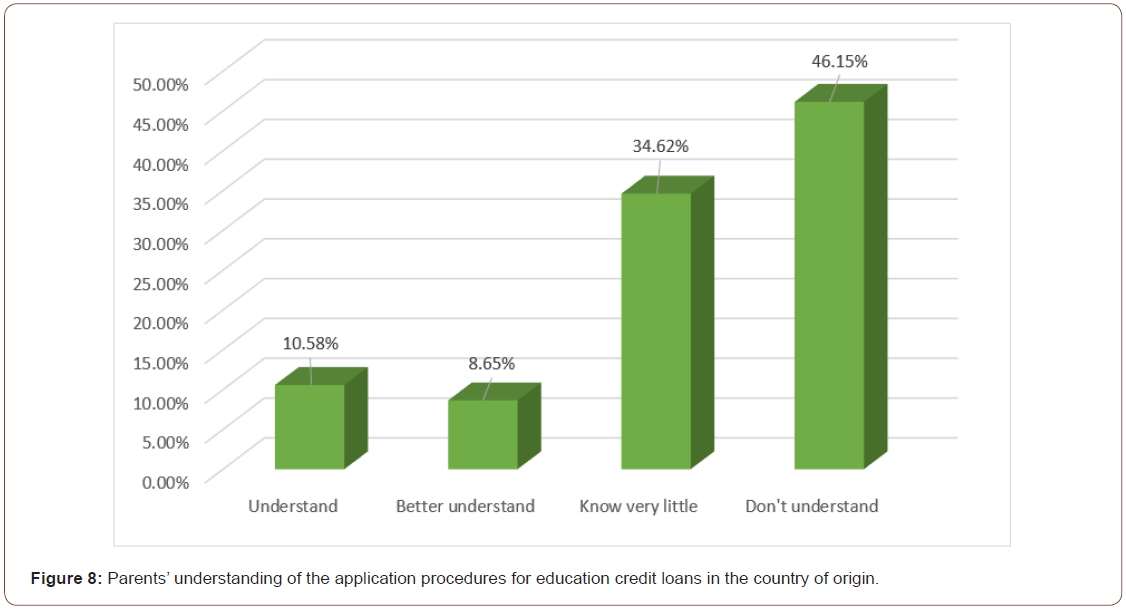
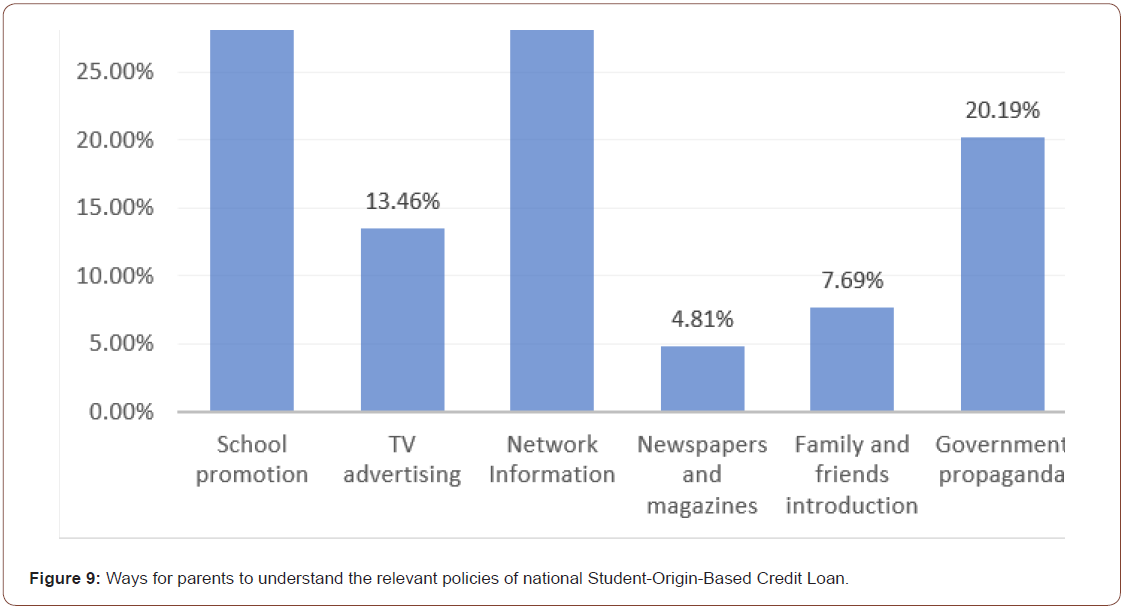
According to Figure 10, 23.08% of the parents still think that they have not heard of the publicity and activities in this area, and 25.00% of the parents have only heard of this policy and do not know the specific content. From these data, it can be seen that most parents do not know well or even understand the content of the national Student-Origin-Based Credit Loan policy, suggesting that the publicity work of the policy has not been well implemented. The national Student-Origin-Based Credit Loan policy is a powerful measure that combines poverty alleviation with aspirations and intelligence to prevent poverty from returning. Related propaganda mechanisms should be established and improved (Figure 10).
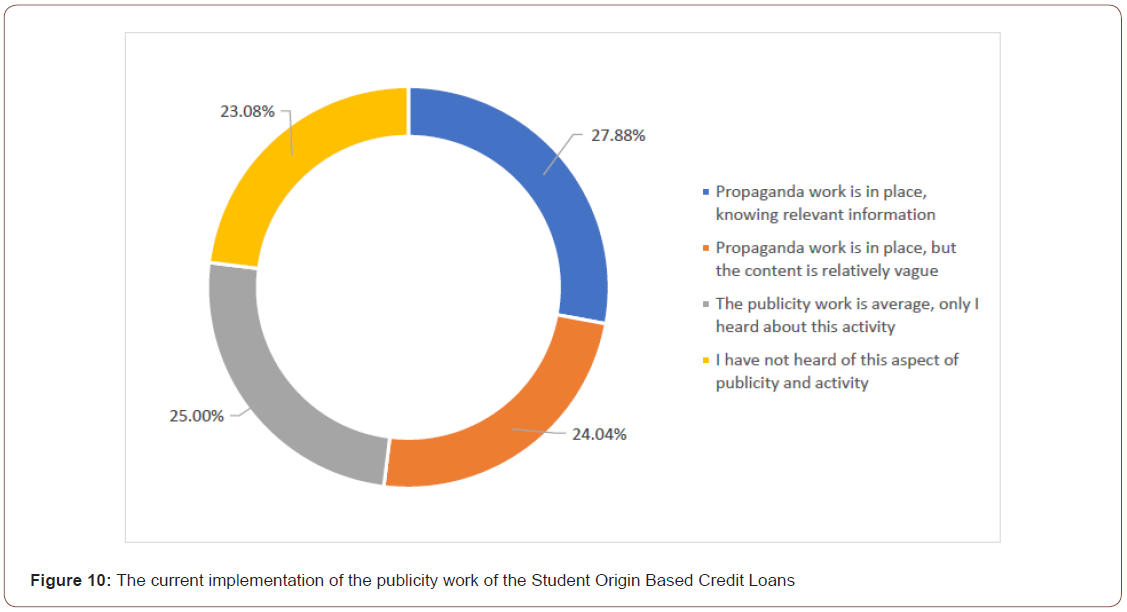
Analysis of Survey Data Statistics
The current situation of building a strong line of defense for “alleviating poverty and not returning to poverty” in Tangkou Town, Kaiping City, Jiangmen City
There is desensitization back to poverty: Desensitization refers to the loss of sensitivity or responsiveness of the povertyrelief targets to policies, and essentially refers to policy failure. Desensitised return to poverty is the result of new policy changes that make it difficult to sustain stable development because the original policy incentives no longer work. This phenomenon is mainly manifested in the status quo of the national Student-Origin- Based Credit Loan in Tangkou town, where there are few publicity channels for the local national student loan policy, and the publicity effect is not good. Figures 3 to 7 show that both online publicity and school publicity account for more than 30%, but only 30% of the villagers think clearly about the content of the publicity. This has also led to the fact that local villagers know very little about the national student loan policy. Figures 2 and 3 show that only 4% of students really understand the policy. Due to the remoteness and lack of information in this area, many students and parents lack understanding of the national student loan policy, which is not conducive to the implementation and implementation of the national student loan policy. When there are problems in the transmission of information, there are some good policies that cannot benefit local residents in a timely manner. This has also triggered off some local families with educational needs to be unable to get help in time.
Abruptly interrupted return to poverty: By interrupted return to poverty, it refers to the poverty return resulted by losing the capacity to produce wealth in the case of supply shortage. It is characterised by signs of return to poverty once financial and technical support for specific groups and regions is stopped or reduced. This phenomenon is mainly manifested in terms of the status quo of the Student-Origin-Based Credit Loans in Tangkou Town as that some students do not have a sense of gratitude and have a similar concept of “waiting for the government to send a well-off society”. Figure 6 show that more than 75% of the sponsored students have the consciousness of gratitude and giving back to the society. According to the survey, 15.38% of parents report that all the poor students around them are grateful and willing to give back to the society, and 56.73% of parents report that most of the poor students around them are grateful and willing to give back to the society. It is worth noting that 24.04% of the parents report that only a small part of the poor students around them have a sense of gratitude and repaying the society, and even 3.85% of the parents report that the poor students around them do not have a sense of gratitude and take it for granted. This shows that gratitude education in schools, families, society, etc. still needs to be continued and continuously strengthened.
The main problems in building a strong line of defense of “alleviating poverty without returning to poverty” in Tangkou Town, Kaiping City, Jiangmen City
The main internal and external factors that contribute to the risk of returning to poverty include economic development dynamics, unexpected factors that increase the risk, and the ability to develop oneself. In terms of strengthening the defense line of “getting out of poverty and not returning to poverty”, the main problems in the national student source credit student loans in Tangkou Town are:
The publicity effect of the Student-Origin-Based Credit Loans is not good: Statistically, the interviewed people have very little knowledge about education loans and other funding methods. The lack of understanding of the preferential content of national student loans has led parents to confuse national student credit loans with loans from other commercial banks and to reject them for fear of being cheated. This shows that in the work of building a strong line of defense against poverty and not returning to poverty, it is still necessary to strengthen the contact with the masses, and to deepen the masses’ understanding of policies in a better way.
It is generally believed that the application procedures of the Student-Origin-Based Credit Loans are complicated, and the timeliness is low: The survey shows that villagers generally think that the application process is complicated, and the process is cumbersome. Some students and parents even think that the threshold for student loans is high and the probability of success is small, so they are reluctant to have a try. There are also some families who are not well-educated, they are hesitant to report complicated procedures, preparation of numerous certification materials, and strict contract management, or are afraid of personal information leakage. This shows that the work methods still need to be improved in the work of building a solid line of defense against “eliminating poverty and not returning to poverty.”
Lax loan vetting and weak post-loan management: Students cannot repay their loans on time, and even some students cherish the illusion that they can avoid bank debts by leaving school. This has largely restricted the development of loan policies, and it is undoubtedly worse for students to take the initiative to understand the application of loans, which also deviates from the original intention of the national student loan. This shows that in the cause of building a solid line of defense for “eliminating poverty and not returning to poverty”, the unfinished work should be completed more rigorously.
Some students lack a sense of gratitude: Most of the poor students are able to be grateful, self-reliant and motivated to give back to society in the future after receiving financial assistance. However, there are also a few students who are dependent and inert, taking state support for granted. This impinges on the credit investigation of students after graduation, and there are also big problems in the later evaluation of the policy. This situation is a problem of the self-development ability of the masses, which will lead to the emergence of people who return to poverty due to low self-development awareness, poor subject quality, and fragile resilience to risks [4].
Typical Cases
Location of a typical case-Introduction to Zhonghe Village, Tangkou Town, Kaiping City
Zhonghe Village Committee is located in the west-central part of Tangkou Town, Kaiping City, Guangdong Province, with a total area of 4 square kilometres and a total population of 1,345, with about 500 expatriates living abroad. This village, only 15 kilometers from the city, is populated with 552 households. It is close to Beiyi Village, Li Village, Zhaiqun Village, Yijing Village, Nanping Village, Qiangya Village, Tanxi Village, Shengping Village, Gangling Village, and Sanshe Village, Kuicao Village, Sijiu Village, Weixing Village, Longhe Village. The village is mainly engaged in rice cultivation, with arable land covering 3216.2 mu, of which 1660.5 mu are paddy fields and 1565.5 mu are dry fields. There are 8 natural villages under its jurisdiction, namely Zhongcheng Village, Dongxin No. 1 Village, Dongxin No. 2 Village, Qixing Village, Xicheng East Village, Xicheng West Village, Dongxing Village, and Zhonghe Village.
On September 24, 2019, Zhonghe Village, Tangkou Town, Kaiping City was listed on the list of establishment units of the “Demonstration Village (Community) of Democracy and Rule of Law” in Guangdong Province in 2018.
Basic information of typical cases
In Zhonghe Village of Tangkou Town, there is a disabled couple. The wife was disabled because of an accident while working in a factory, which made her incapacitated. The husband was disabled in a traffic accident in 2012. Although he did not lose the ability to work, he still has both hands maimed. And there was one child and one daughter in the family. At that time, the son was in high school, and the daughter was only in junior high school. In order to support the two children in school and to make both ends meet, Mr. Zhou has contracted fishponds himself in 2013, and through his own hard work, the hardest time has gone. The village council, together with various villagers in this village, also understood their family’s situation and offered to give them a rent reduction for their fish pond in order to reduce their burden. All of the children have completed their studies through the national student loan policy during their studies at the school. They have now graduated. The son graduated from an undergraduate college in Guangdong Province, and his daughter graduated from a junior college. After the couple’s children came out to work, the family’s labor structure was changed, which increased the family’s income and helped the entire family get rid of poverty.
Suggestions and Conclusion
Suggestions on the National Student-Origin-Based Credit Loan Policy to Build a Strong Defense Line of “Eliminating Poverty and Not Returning to Poverty”
Regarding the poor effect of publicity of the credit student loan
policy in the national student source area:
• The reason why the publicity effect of the Student-Origin-
Based Credit Loans is not good among the populace lies in that
the public has insufficient awareness of the policy and low
attention to it, and the form and method of publicity of the
policy need improving.
• Training professionals responsible for disseminating
information at the sub-town level to consolidate the results of
the fight against poverty and to avoid signs of return to poverty.
• Improving publicity methods and diversifying publicity.
• Online and offline synchronization, big data promotion.
Regarding the issue of lax loan review and weak post-loan management: Banks and schools should strengthen the links between them and students and parents, and explain the National Student Credit Loan Policy to ensure that students and parents are fully aware of the operational mechanism of the National Credit Loan Policy and the importance of financial support for students and families in need, and that this is an important line of defence to ensure that they do not return to poverty and that it is the common responsibility of all beneficiaries to maintain the long-term, healthy and sustainable development of the National Student-Origin-Based Credit Loan System.
Regarding the pressure of poor families to repay loans: In terms of families, efforts should be made to strengthen the support for spiritual poverty and encourage them to shape a more correct value and outlook on life. Ideological poverty is the greatest enemy in face of a comprehensive well-off and consolidating the achievements of poverty alleviation. Poverty alleviation must be combined with the support of the intellect and the will; guide poor families to grasp the opportunity of the national student loan policy, put aside their ideological burden, and trust the party and the people’s government.
In terms of schools, increasing the breadth and depth of scholarships and providing more work-study positions can help students with special financial difficulties complete their studies and improve their ability to repay loans. At the same time, it is necessary to strengthen the development of party history learning and education, to learn from history, and to draw spiritual strength from the deeds of the revolutionary ancestors and improve the sense of social responsibility and self-accountability.
In terms of society, the internationally recognized successful ICL method, that is, the “repayment in proportion to income” method, can be used to balance the debt burden of students in different periods and maximize the loan recovery rate.
Regarding the lack of gratitude for some students: It is necessary to strengthen the integrity education for students, actively carry out the education of party history, learn the spiritual aspiration of the ancestors, enhance the sense of gratitude and pay back the society, truly understand and recognize the role and significance of the party and the state in vigorously developing education, and understand that the government does not allow any child or young person cannot get educated because of poverty. The national Student-Origin-Based credit loan policy is used to build an important line of defense for “getting out of poverty and not returning to poverty”. At the same time, further improving the construction of the personal credit system and increasing the penalties for personal loan defaults are needed. The establishment of a sound personal credit system will help reduce the problem of national education loan arrears, and it is a “rooted” strategy to solve the problem of defaults. The People’s Bank of China should establish a credit information database for loan students with the education administration, and gradually establish a personal credit system covering the entire society, strengthen institutional constraints on student credit, and adopt comprehensive measures to prevent loan defaults and prevent financial risks [4].
Regarding the lack of “blood-generating” capacity triggered
by exodus of rural labor:
• Comprehensively promote rural revitalization, strengthen
infrastructure, and improve public services. Introduce talents
to the countryside, provide corresponding positions and
promotion channels to retain talents, encourage outside talents
to go home to contribute in their hometowns, and add vitality
to the countryside.
• Develop modern agriculture and integrate urban and rural
management. Let laid-off workers and college students go to the
countryside to engage in modern agriculture, combine modern
science and technology, and innovate high-tech agriculture, so
that more young people can join in it. As long as there are good
benefits from agriculture, there will be more people engaging in
it.
• Raise the income level of farmers, especially that of
modern farmers. In some agriculturally developed countries,
the government has provided huge subsidies to farmers, and
the income from farming is no worse than that of other sectors.
With this economic foundation, the public can truly regard
farmers as a profession, rather than an identity title, and to
better achieve “elimination of poverty without returning to
poverty”. The government also needs to increase support and
guidance for college students majoring in agriculture.
Summary
Activity development: The social practice, launched by the team ‘’Yi-Xin-Zhu-Meng’’ in Tangkou Town, Kaiping City this time with the theme of ‘’Building Dreams in the City Heart-Building a Strong Defense Line of ‘Alleviating Poverty and not Returning to Poverty’ and Helping Rural adopted offline interview combined with investigation and publicity; it took 5 days to interview village committees in 9 villages, and distribute 160 questionnaires in fields, street shops, and township markets in Tangkou Town.
Evaluation and improvement of problems in activities: In
this event, the following issues were summarized and reflections
were made.
• When distributing and collecting questionnaires, refusal,
language barriers, successive setbacks and poor results are
common, thus generating a sense of frustration, so it is easy to
feel frustrated. The solution is to stop issuing questionnaires
to intersperse some visits to the village committee during
the process so as to relieve physical and psychological fatigue
effectively.
• Due to time constraints, the research on relevant typical
cases is not “deep” enough. Online and offline synchronization
methods can be used to obtain more first-hand information, so
as to better build a defense line of “getting out of poverty and
not returning to poverty”.
• The study and education of party history are not closely
related to the publicity of the Student-Origin-Based Credit
Loans, which needs to be strengthened. Deeply implement the
study and education of party history to draw spiritual strength,
so as to internalise it in heart and externalise it in action.
Activity harvest: This event is a feast for everyone in the “Yi- Xin-Zhu-Meng” to strengthen their spiritual learning. In this event, the team members experienced the country’s great victory in the fight against poverty. After the overall victory of the fight against poverty, the primary problem in front of them is to prevent the return to poverty. In interviews with the village committee staff, it can be seen that the staff of the village committee attached great importance to the work of “getting out of poverty and not returning to poverty” for all poverty-stricken households. The tough battle must be fought one after another, and the pace of struggle will never stop. When visiting the Memorial Hall of Revolutionary Martyrs, the team members experienced firsthand the arduous struggle of revolutionary martyrs for national independence and national liberation. After listening to the red stories of the hometown of overseas Chinese in Wuyi, the team members all believed from the buttom of their heart that it is crucial to learn from those heroes and models, draw the strength from them, strengthen one’s ideals, dare to shoulder responsibility, and consciously learn from history and wisdom. Learn history to understand, learn history to believe, learn history to be virtuous, learn history to practice.
Acknowledgment
This research is supported by the project of “High Education funding of Guangdong Province: 2018KZDXM072”; the College Students’ Innovation and Entrepreneurship Project: 5031700602O6; the Natural Science Foundation of Guangdong Province: 2021A1515010704.
Conflict of Interest
No conflict of interest.
References
- Yang Jianliang, Lei Dongli (2020) National University Funding Policy and Targeted Poverty Alleviation and Targeted Poverty Alleviation. Based on a field survey of H Village in Zhaoqing, Guangdong % J China Market 33: 32-33. (In Chinese)
- Li He (2021) Research on the Risks of Returning to Poverty and Countermeasures in Rural B County, Hebei Province. Hebei University. (In Chinese)
- Zhu Wenyan (2020) Research on the Implementation of Funding Policies for Poor Students in Higher Vocational Colleges. Hubei University of Technology. (In Chinese)
- Lang Xing (2020) Research on the Function of Ideological and Political Education Supported by College Students. Liaoning Normal University. (In Chinese)
-
Yunlin Zhou, Xuanhua Chen, Ziqi Lin, Qiang Huang, Xiaoyun Li, Danxin Zhong, Gui Chen, Jiujiang Zhu. Build a Strong Defense Line of “Advancing and Consolidating Poverty Alleviation” to Help Rural Revitalization. Glob J Eng Sci. 9(3): 2022. GJES. MS.ID.000715.
-
Poverty alleviation, National student source credit student loan policy, Poverty alleviation without returning to poverty, Rural revitalization
-

This work is licensed under a Creative Commons Attribution-NonCommercial 4.0 International License.






